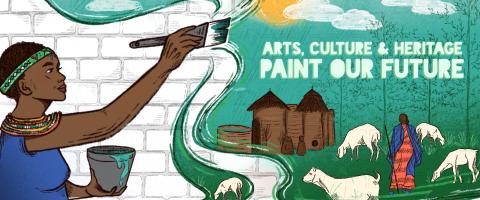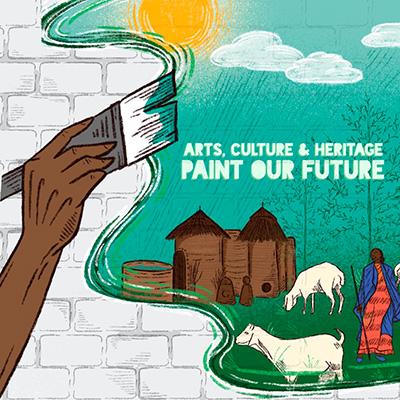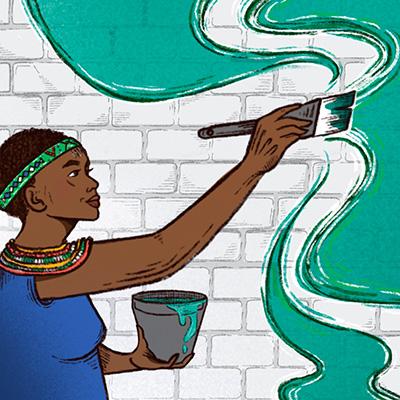The power of culture, arts and heritage in shaping climate resilience in Africa
The power of culture, arts and heritage in shaping climate resilience in Africa
The Africa Regional Resilience Hub, led by SouthSouthNorth (SSN), is a crucial component of the COP28 Resilience Hub. Along with several other regions, the Regional Hubs work to amplify regional voices to global decision-making spaces, with a particular focus on communities and underrepresented and lesser heard voices. This feature forms part of the Africa Regional Hubs efforts in this regard. The COP28 Resilience Hub events are all hybrid and allow for virtual attendance and participation. Register here for the Resilience Hub virtual platform.
This post first appeared on the SouthSouthNorth website.

Key Message: Culture, encompassing arts, heritage and indigenous wisdom, empowers individuals to envision and actualise low-carbon, just and climate-resilient futures. By seamlessly blending scientific, local and indigenous knowledge systems, these culturally rooted approaches consider the diverse contextual factors that shape communities and their response to climate change. The holistic nature of these strategies extends to the evaluation of both intangible and tangible assets, culminating in culture-based adaptation solutions that fortify resilience in the face of climate change.
The global challenge of climate change extends beyond conventional scientific and policy solutions
Addressing this challenge necessitates innovative, comprehensive approaches that recognise the intricate nature of human existence. While Africa is responsible for only a fraction of global greenhouse gas emissions, it suffers disproportionately from climate change and faces urgent threats to communities, ecosystems and cultural heritage. Within this context, Africa's diverse culture provides a compelling backdrop for exploring the vital role of cultural approaches in combating climate change. Initiatives like Preserving Legacies and the Climate Vulnerability Index Africa emphasise the significance of local and indigenous knowledge in bolstering resilience. They empower individuals and communities to envision and realise low-carbon, just and climate-resilient futures by integrating various knowledge systems into climate risk assessments and adaptation strategies.
Culture extends beyond traditions and customs; it encompasses a society's collective knowledge, values and practices
Climate change and culture are inextricably linked and excluding culture from climate conversations neglects a fundamental element shaping human behaviour and values. Instead, culture should play a central role in discussions. Leveraged effectively, cultural approaches provide a unique avenue to foster climate resilience, nurturing a profound connection with the environment and promoting sustainability. Through culture-based approaches, we can combine age-old practices with modern scientific insights to develop a holistic understanding of our world and its challenges.
Intricately interwoven with the continent's diverse ecosystems, African cultures have evolved over millennia, encompassing thousands of languages, traditions and belief systems. African cultures have an array of traditional practices and adaptation strategies that are highly relevant in the context of climate change, such as rainwater harvesting, agroforestry, indigenous crop varieties, pastoralism, beekeeping, drought-resistant livestock breeds, weather forecasting through traditional knowledge, community-based resource management and early warning systems, fire management, building design and seed banks. For example, in East Africa, pastoralist communities have established intricate systems for managing water resources and mobility patterns for their livestock, strategies that can be adapted to cope with changing rainfall patterns and drought. Similarly, the traditional architecture of many African communities, such as the bermed houses of the Dogon people in Mali or the Mudbrick Houses in Morocco, offers natural temperature control, reducing the energy needed for heating or cooling. These practices rooted in culture offer low-carbon and climate-resilient solutions.

Indigenous knowledge in Africa holds valuable climate-resilient practices developed over centuries and deeply tied to local ecosystems
For example, African farmers possess traditional wisdom regarding crop varieties, planting seasons and soil management tailored to changing climate conditions. In Mali, agroforestry is a longstanding practice, enhancing soil fertility and water retention by integrating trees into agriculture. In Ghana, coastal communities have adapted their livelihoods and crops to combat flooding. In many African regions, cultural approaches fuse indigenous practices with modern scientific knowledge. For example, in Ghana, traditional leaders and scientists work together to restore degraded ecosystems using indigenous tree species that are well-suited for the local climate. In South Africa, the organisation "Indigenous Terra Madre" works with indigenous communities to establish community seed banks that safeguard traditional crop varieties. Ethiopia's Farmer Field Schools train farmers on climate-resilient agricultural practices, integrating traditional knowledge with modern techniques and equip farmers to adapt to changing weather patterns, reduce greenhouse gas emissions and improve food security.
Cultural heritage sites, such as the ancient city of Timbuktu in Mali, the rock art of the Drakensberg Mountains in South Africa, the Koutammakou in Togo and Benin and the Great Zimbabwe ruins, provide invaluable insights into how past civilisations adapted to their environments. These sites are not only historical treasures but also hold the key to understanding sustainable practices that can inform modern adaptation efforts. By preserving and studying these heritage sites, African communities can draw inspiration for low-carbon, climate-resilient futures. All over the continent, communities occupying Natural World Heritage Sites for centuries have displayed significant resilience to climate variability. However, as climate change intensifies, their resilience weakens. Preserving their heritage assets and values becomes essential to bolster their climate resilience.
Culture-based adaptation approaches often emphasise community participation and ownership
Communities are actively involved in decision-making, which empowers them to develop and implement climate-resilient strategies tailored to their unique cultural and ecological contexts. In Kenya, the Maasai community has established community-based conservancies to protect their pastoralist way of life while adapting to changing environmental conditions. In Ethiopia, community-based organisations have revived traditional water management systems, such as 'qanats,' which tap into underground aquifers, improving food security and livelihoods while enhancing climate resilience. The Osun-Osogbo Sacred Grove in Nigeria is a UNESCO World Heritage site and a living example of culture-based climate resilience. The grove is not only a place of spiritual significance but also a model of forest conservation and sustainable management.

Culture serves as a catalyst in shaping low-carbon, just and climate-resilient futures in Africa, integrating indigenous knowledge, traditional practices, ecosystem conservation and cultural heritage
Cultural approaches to climate adaptation empower communities to confront the challenges of a changing climate, offering enduring lessons for a sustainable future. This is a call to action, urging us to wholeheartedly embrace the deep-rooted interplay between culture, nature and climate, particularly in Africa. This continent could illuminate a path towards a harmonious, sustainable and resilient future in our ever-changing climate.
Author bio: Salma is the Networking Coordinator for the National Geographic project "Preserving Legacies: A Future for our Past" and a part-time Postdoctoral Researcher at the University of Southampton, focusing on coastal communities in Vietnam impacted by sea-level rise. In her personal life, she raises climate awareness, advocates for various causes and enjoys nature and music.
